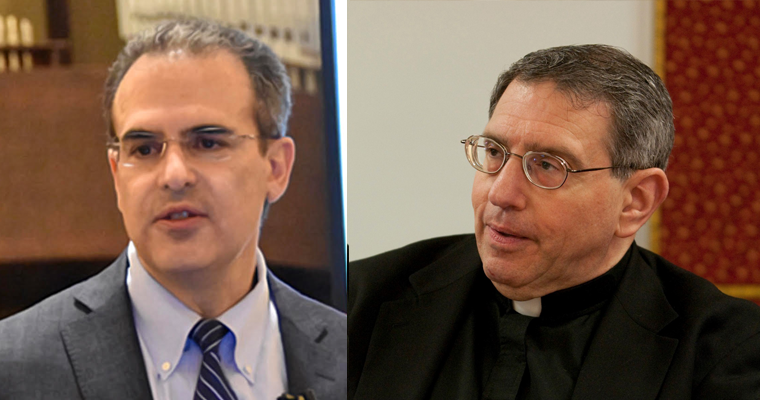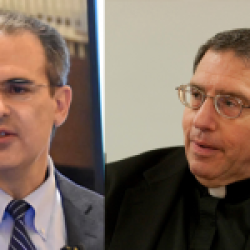By Dr. Paul Fiacco and Father Charles Vavonese
Special to the Catholic Sun
Editor’s note: This is a summary of the series of articles that explained and explored the Church’s teachings on end-of-life and palliative care issues.
Dr. Paul Fiacco is the president and medical director of CNY AIM, a St. Joseph Health clinically integrated network (CIN), and the medical director of the Trinity Health Integrated Care ACO. He is also a full-time family physician at CNY Family Care in East Syracuse. Dr. Fiacco is a parishioner at Holy Cross Church in DeWitt.
Father Charles Vavonese is a retired priest of the Diocese of Syracuse, and was the author of “I Am the Resurrection and the Life,” a resource booklet dealing with end-of-life moral issues which is no longer available. He currently serves patients receiving palliative care as the chaplain for the St. Joseph Health Mobile Integrated Services Team. In addition, he assists on weekends at Holy Cross Church in DeWitt.
Introduction
Over 100 years ago, the leading cause of death was infectious diseases; today, most people will die from chronic diseases. While medical care has improved and extended our lives over the last century, it has also presented us with several moral and medical dilemmas.
The articles we’ve presented over the last several months have aimed to combine medical care with spiritual care, to provide a holistic approach to the difficulties of end-of-life decisions and moral issues. Illuminated also is the Catholic vision of life, and how an understanding of this vision serves as a backdrop to palliative care and its assistance to individuals when making end-of-life decisions.
Roadmap
The Catholic vision of life recognizes that our ultimate destiny is to be with God for eternity. Catholic theology provides a roadmap to navigate the complexities of end-of-life moral dilemmas; it requires that we avoid the extremes of vitalism and subjectivism. Vitalism holds that life must be preserved at all costs and that all available treatments must be undertaken to keep the patient alive. By contrast, subjectivism holds that life has value only when an individual determines that that life has value. Catholic moral teaching provides us guidance to avoid these conflicting two extremes.
Ordinary and extraordinary care
Understanding the difference between ordinary and extraordinary medical treatments is critical and better understood when Catholic moral teaching is applied. Ordinary care provides a benefit to the patient and presents no excessive burden; in Catholic theology, this type of care is morally obligatory. By contrast, extraordinary care may provide conflicting benefit to the patient as well as excessive burden. In Catholic teaching, there is no moral obligation to accept extraordinary treatments.
Burdensome treatments
There are many considerations for a patient and caregivers in determining if a treatment proposed imposes an excessive burden and can be forgone or withdrawn. Some of these considerations include: the treatment severity, prognosis, risks, and side effects; the potential for recovery; and whether the treatment imposes significant spiritual, emotional, or financial expense to the patient, family, or community.
Burdensome treatment is only determined by a patient’s individual assessment. It is important to note that patients in similar situations will assess these various considerations differently and may come to different conclusions that are both morally acceptable. In the process of making these decisions, the patient must have accurate information from medical providers and is encouraged to seek the counsel of family and a priest.
Quality of life issues
There are two contexts in which “quality of life” is used in end-of-life discussions. The first is when a patient with a serious condition decides to forgo or withdraw a treatment that is considered extraordinary care or excessively burdensome in favor of enjoying the remainder of life in a comfortable manner. This decision is permissible in Catholic theology. In the second situation, the diminished “quality of life” of a person with a disability or serious illness is used by some to justify terminating lives by those who propose euthanasia or assisted suicide, which is never permissible in Catholic moral teaching.
Pain management
The administration of medication for pain in terminal patients — though it may shorten their lives — is permitted in Catholic theology by using the principle of double effect developed by St. Thomas Aquinas, a medieval theologian. St. Thomas developed this schema for resolving dilemmas that occur when a single action has both a “good” outcome and an “evil” outcome.
According to Aquinas’ analysis, for an action with both a “good” and an “evil” outcome to be morally acceptable, all of the following criteria must be met: 1) the nature of the act must be morally good or at least neutral; 2) the intention of the action must be to achieve the good effect, not the bad effect; 3) the bad effect must not be the means to bring about the good effect; and 4) there must be a proportionate reason to justify or tolerate the bad effect.
The principle of double effect can be applied to a situation where the administration of pain medication to a terminally ill patient may indirectly shorten his life. First, the use of medications to relieve pain is a morally “good” action. Second, the relief of pain must be the intended outcome, not the shortening of the patient’s life. Third, the shortening of the patient’s life — or even his or her death (evil effect) — is not the means by which pain is relieved (good effect). Finally, the “good” effect of sparing pain in the terminal patient provides sufficient proportionate reason to justify or tolerate the possible shortening of his or her life.
Since in this analysis all of Aquinas’ criteria have been met, the administration of pain medication to a dying patient is a morally acceptable choice even though it may have the unintended but foreknown effect of shortening the patient’s life. For this and all end-of-life decisions, it is best to get the counsel of a priest or other person knowledgeable in Catholic health care ethics.
Nutrition and hydration
The Church teaches that nutrition and hydration — provided by natural or medically assisted means — is basic human care and is also considered ordinary or proportionate care. This is, in principle, morally obligatory even for those in a persistent vegetative state. However, there are situations when medically assisted nutrition and/or hydration may become extraordinary or disproportionate and may be forgone or withdrawn. These situations may occur when death is imminent, when the treatment is determined by the patient or a surrogate to be a burdensome treatment, and when offering the nutrition and hydration would be futile. St. John Paul II articulated that withdrawing or forgoing such extraordinary or disproportionate care in these cases is not suicide or murder.
Sacrament of the Sick
The Sacrament of the Sick continues the healing ministry that Jesus entrusted to the Apostles. The sacrament has developed significantly over the centuries. Most recently, the Second Vatican Council (1962-1965) restored the original intent of the rite as Anointing of the Sick as a reaffirming of the healing nature of the sacrament, and significantly expanded the number of individuals who may receive it.
Advance planning
The health care proxy and advance care directives, guided by Catholic morals and teachings, give instructions for your medical care should you become unable to make those decisions on your own behalf. The health care proxy is the most important end-of-life planning document individuals can execute. Advance care directives, when guided by Catholic morals and teachings, give instructions for your care to your health care proxy should the proxy need to make medical decisions on your behalf. Since people can become incapacitated at any age, everyone should consider completing a health care proxy document.
Additional resources are available through the National Catholic Bioethics Center (NCBC) for end-of-life moral decisions.
Palliative care
In its truest sense, palliative care provides life-affirming, comprehensive, and interdisciplinary care for people with serious illness and their families. St. Marianne Cope modeled this comprehensive care by providing relief to those with Hansen’s disease (leprosy) in the late 1800s. So important is palliative care that Pope Francis recently issued a white paper calling on policy makers, colleges, universities, health care institutions, medical professionals, the media, spiritual care professionals, and others in the Church to advocate for palliative care.
A new model for delivering palliative care into the community augments the traditional office-based model by providing the care needed to patients with serious illness directly into their homes. A community-based palliative care program allows patients to maintain their independence as they cope with the progression of their illness and treatment. The goal is to improve the life and care of patients and their families while reducing the burdens caused by their serious illness. The success of these programs and the ability to reach more vulnerable patients in our community depends on an expanded collaboration between the Church, other faith communities, and healthcare system networks. With this collaboration, palliative care becomes a powerful antidote to euthanasia and physician-assisted suicide.
End-of-life documents
There are a large number of documents that assist us with end-of-life issues; since many of them have similar names, confusion frequently occurs.
• Health care proxies and advance care directives are discussed in the “advance planning” section.
• A power of attorney allows you to empower another person to act in your behalf for legal and financial matters.
• A last will and testament outlines who will receive your assets upon your death. Another important purpose of a will is to specify guardianship for your minor children.
• DNR is the acronym for a Do Not Resuscitate order. A DNR is the order given by you not to be resuscitated by CPR (cardiopulmonary resuscitation) so that if your heart stops or you are no longer breathing on your own, health care providers or bystanders will not attempt to revive you.
• DNI is an acronym for Do Not Intubate. It is an order given by you indicating that if you become unable to breathe on your own, you do not wish to be connected to a machine that will breathe for you. For elderly Catholics or those with a serious illness, deciding about a DNR and DNI requires weighing the benefits and burdens of CPR or intubation and whether either constitutes ordinary or extraordinary care.
• An organ donation card gives the hospital permission to retrieve organs after your death for donation to other individuals in need of them.
• Medical orders for life-sustaining treatment (MOLST) is the document used in New York State as the legal form establishing the medical orders necessary to administer or withhold treatments. The MOLST document will refer to a patient’s prior legal health care documents such as the health care proxy, advance care directives, and DNR. Some bishops’ conferences urge caution when filling out the MOLST form as the document is intended for use only by those who are in the final stages of illness or frailty.
Concluding article
The next article will conclude this series and will discuss the synthesis of Catholic moral theology and palliative care as it applies to current health care decision making.





